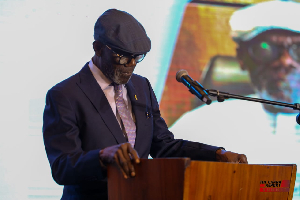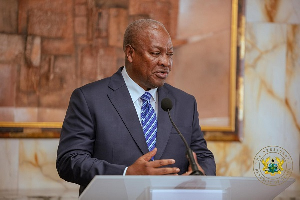Accra, Feb. 18, GNA - Dr. Sam Adjei, Chief Consultant of the Ghana Health Service (GHS), on Monday said some illnesses required "health talk" that would make people shift from curative to preventive lifestyles.
He said not all illnesses required drugs and called for in-service training for medical practitioners to enable them to prescribe lifestyle antidote to illnesses that were associated to unhealthy lifestyles. Dr Adjei, who was speaking at the launch of a Nation Health Promotion Policy in Accra, said such health promotion information should be made available to help increase the health literacy in the country. The 16-page policy is to, among other things, ensure that there is active involvement and participation of individuals, families and communities and civil society as well as influence behavioural change. He suggested that the Ghana Health Service set aside a month every year to create the needed awareness aimed at improving health problems through a variety of measures.
Dr. Frank Nyonator, Director, Policy, Planning Monitoring and Evaluation of GHS, who launched the document, noted that the policy was developed in response to World Health Organisation (WHO) recommendation to member countries, especially in Africa, to formalise policies on health promotion on the continent. He said in developing the policy document, careful consideration was made to place it within the context of relevant strategic document and framework of the Ministry. Dr Nyonator said health promotion was a means of increasing individual and collective participation in health actions and of strengthening programmes through integration methods. These methods, he observed, are combined through a comprehensive approach, which ensured action at all levels of society, leading to enhanced health.
Dr Joachim Saweka, WHO representative, said a nation could only attain meaningful development when its people were healthy and a deliberate effort was made to inform the people about the need to stay healthy as well as how to attain and maintain good health. The major thrust of the health promotion strategy adopted by WHO/African Region 2001 is the emphasis of integrating the various methods and approaches to improve the health of the people. He said priority action recommended by the strategy included advocacy, capacity building, plan of action, involvement of all sectors and strengthening of health programmes.
Mrs Mary Arday-Kotei, Deputy Director, Health Promotion, said the department was faced with some challenges, key among which was inadequate staff at all levels especially at the districts where the bulk of implementation took place and inconsistent funding for health promotion activities.
These challenges, he said, did not enable the department to sustain interventions long enough to achieve the desired behavioural outcomes. She noted that the process for the development of the policy document had taken time and explained that though it was completed in 2005, funding from WHO has made it a reality.
Health News of Monday, 18 February 2008
Source: GNA












